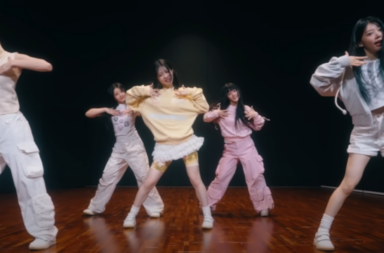Seoulbeats is run by fans and not-for-profit. As we celebrate our 14th anniversary this July, we are running a fundraiser. If you like our content, please consider supporting us at ko-fi.com/seoulbeats!

Since the end of I.O.I, Chungha has kept her career on a tight leash. From the release of her first EP, she has crafted and controlled her image to give off the aura she wants. And while normally the control being so visible is a detriment, it works very well when the desired image is “control”. Chungha presents herself like a queen: in power, looking down on her followers, and utterly assured of her having the final word. And that confidence in her control is not limited to her singles. If anything, her power and authority come through more clearly on her b-sides, when she doesn’t have to worry about marketability.
The first sign of this attitude can be seen on the opening track of her debut EP, Hands On Me. Jazzy, bluesy and seductive, “Hands On Me” has an interesting dichotomy: it both calls back to an era when women were expected to be passive, and immediately places Chungha as the dominant partner. Clocking in at a little over a minute, it’s sadly too short to count as a full entry, but gets an honorable mention for being Chungha’s only good intro track.
The jazzy tones are thankfully picked up on “Bad Boy” from Offset, Chungha’s second EP. It plays slightly differently from “Hands On Me”, leaning towards swing and big band music instead of blues. “Bad Boy” has a playful, mocking edge that mixes well with Chungha’s tone of passionate dispassion. A bad boy has caught her eye and is trying to woo her, and rather than get swept up in his charms or try to fix him, she goes along– until she doesn’t. Chungha may enjoy the thrill, but she genuinely does not care about him, and is perfectly content to drop him the moment he fools around. She is too smart to fall for the bad boy, but also smart enough to enjoy a good fling when it appears. Her passivity is not an act of deference, but defiance: everything is on her terms, and when the man fails to maintain her standards, she kicks him to the curb, making it clear just how little he meant, all while whirling on to the next man.

From her third EP, Blooming Blue, is “Cherry Kisses”. While ostensibly a love song, “Cherry Kisses” shows that Chungha views relationships from a very self-centered mindset. There is nothing about her crush here. Instead, the focus is entirely on Chungha and her feelings. She wants this guy, so she gets this guy. She literally summons him to adore her, and the one line mentioning that he might not like her comes off as insincere lip service. The track backs the sense of dominion Chungha has. The instrumentation is deceptively sweet, relying on twinkling synths and woodwinds. Yet the fullness in the bass clef and Chungha’s vocal power make it clear that “Cherry Kisses” is a politely worded order over an expression of feelings.
Flourishing, her next mini album, has an interesting pair of songs that offer two different variations on the self-empowerment anthem. “Chica” is inspirational. Leaning into Latin sounds, it allows Chungha to speak directly to her female fans. She wants them to be themselves in the brightest, loudest way, without apology or hesitation. The horns, quick beat, and usage of “chica” create a sense of casual intimacy in a very specific way. The sense given is one of Chungha sitting next to you on Taco Tuesday, drinking margaritas and encouraging you to go for that promotion. But as friendly and supportive as she is, “Chica” has a powerful undercurrent of “be like me”. Be brave like me, be wild like me, let it out like me. She offers herself as an unspoken yet potent symbol of what can happen when women break boundaries.

This sense of power is only amplified by “Flourishing”. While “Chica” is inspirational, “Flourishing” is aspirational. Trading the Latin influences for hip-hop, “Flourishing” sees Chungha dropping the pretense and going full ego. Her life is fantastic, she has no plans to change that, and anyone who questions her can vanish. The track is quite low-key, pulling from trap and lacking any dramatic moments. The result is an air of icy disaffection, showing her unshakable confidence. Chungha takes her current and future success as a given, and by doing so, instills a desire in her audience to be her. To have fame, money, and glamour that will, without a doubt, continue. Who wouldn’t want that?

Off Querencia is “Flying on Faith”, a study of a dysfunctional relationship and gender roles. Chungha loves her partner, and wants their relationship to work, as shown by the sweet vocals and simple yet heartfelt instrumentals. At the same time, she will not allow herself to be mistreated. She knows what is within her ability to do–be supportive, be attentive, listen when he has problems with her–and she offers these things. But her partner’s ex, his self-esteem, his inability to take criticism–these are not her problems, and she refuses to allow them to be placed on her. As much as she wants this relationship to work, Chungha will not demean herself for a man and take on responsibility for everything. As the staccato cacophony on the chorus shows, it hurts her, and faith can only take you so far. There is little doubt that when push comes to shove, Chungha will leave. She means too much to herself to do otherwise.
The last featured b-side is “Comes N Goes”, also from Querencia. A mellow disco track, “Comes N Goes” is richly layered with synths and vocals from multiple melody lines to create a lush, dreamy feel. A partner is fading out of Chungha’s life, but she doesn’t really react. She simply gives her blessing for him to vanish from her life, musing that things come and go. Again, she shows control through passivity. Instead of fighting for this relationship, or asking what went wrong, she accepts that people leave, and there’s no need to get worked up over it. Clinging, desperation, heartbreak; those feelings are beneath her. She is too in control to feel such things.
Chungha has built her brand on a bedrock of control and disaffection. Yet, she has managed to thread the needle by making that control understandable and relatable. She knows how much it hurts when people let you down, so she refuses to allow to that to happen. She lives her life on her terms, no matter what, because if she calls the shots, or just doesn’t care, she cannot get hurt. And really, who can blame her?
(Images via MNH Entertainment, YouTube)


